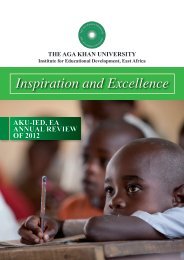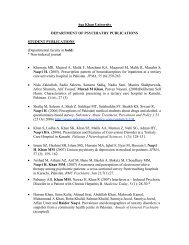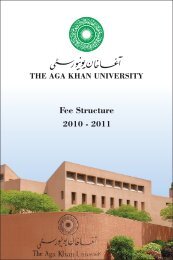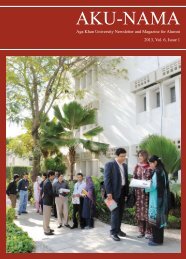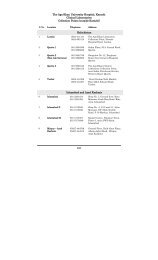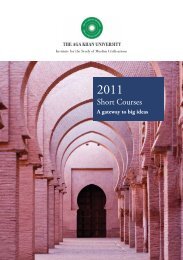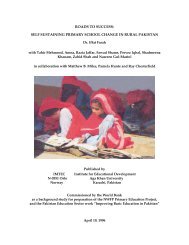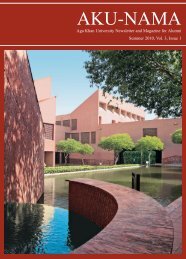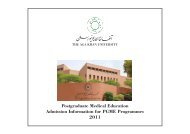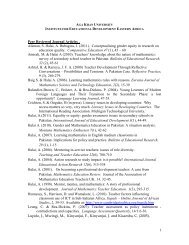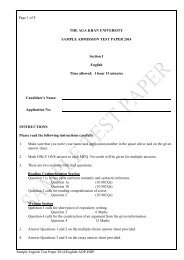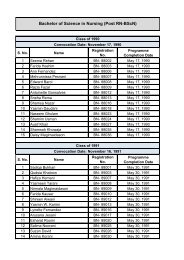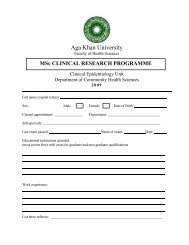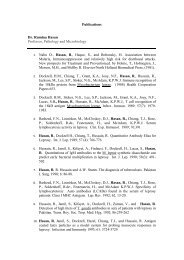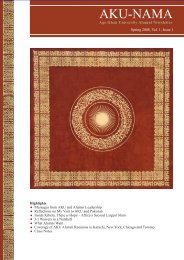Winter 2011, Vol. 4, Issue 2 - Aga Khan University
Winter 2011, Vol. 4, Issue 2 - Aga Khan University
Winter 2011, Vol. 4, Issue 2 - Aga Khan University
You also want an ePaper? Increase the reach of your titles
YUMPU automatically turns print PDFs into web optimized ePapers that Google loves.
Poetry, Music and Medicine<br />
Taimur <strong>Khan</strong>, MBBS ’02<br />
When I joined AKU in 1995, I<br />
was sure that I wanted to become<br />
a psychiatrist. I had read some<br />
works of Freud inspired by two<br />
revered elder brothers’ Ivy League<br />
education. I had been playing the<br />
guitar for five years, was very<br />
curious about the workings of the<br />
human body, and nurtured a vague<br />
fantasy of collating the physical<br />
and mental aspects of human life<br />
biochemically, psychoanalytically,<br />
musically and poetically.<br />
In high school, music was the<br />
first thing which made me realise<br />
I could concentrate on something<br />
worthwhile for extended periods.<br />
Studying medicine for a year<br />
enhanced my patience with books,<br />
and when I encountered literary and<br />
philosophical texts, I was surprised<br />
that so many things were suddenly<br />
making sense. As happens with<br />
great writings, existential concerns<br />
arose. I questioned my opinions and<br />
the type of music I played, which<br />
ultimately led to certain decisions I<br />
made about music and myself.<br />
Profoundly influenced by<br />
Nietzsche and Goethe, I believed<br />
that I had to pursue all my<br />
interests intensively, realising<br />
just in time that ours is an age of<br />
specialisation; and Goethe’s genius<br />
notwithstanding, science itself had<br />
changed over the past couple of<br />
centuries. But reasons are no match<br />
for passions, and so I thought I<br />
would teach myself poetry as I had<br />
dabbled in it since teenage.<br />
And this is where the story<br />
begins.<br />
I started devoting my time<br />
to my newfound love for raagbased<br />
classical music, one of<br />
the oldest musical traditions of<br />
the world. I was very far from<br />
knowing the esoteric realm of<br />
subcontinental classical music and<br />
the counter-intuitive dynamics of<br />
the sarangi, which I had discovered<br />
Taimur <strong>Khan</strong> immersed at a performance.<br />
Saadullah Bashir<br />
entirely by chance in a recording at<br />
a music shop in 1994. Soon after<br />
buying my first sarangi in 1996,<br />
I saw why this bowed instrument<br />
with 3 gut and 35 metal strings<br />
was considered to be so difficult to<br />
tune and play. Thanks to the kind<br />
consideration of Dr Jamsheer Talati,<br />
Associate Dean of Education at that<br />
time, I was able to take two years<br />
off during my education at <strong>Aga</strong><br />
<strong>Khan</strong> <strong>University</strong>, learned music, got<br />
an ample idea of poetic prosody and<br />
wrote poems and a novella.<br />
Returning to college, I had<br />
the peace of mind to continue my<br />
humanistic studies and medicine<br />
with more discipline. Music, I<br />
would ‘tell’ myself, I had to give<br />
up. But then I picked up the sarangi<br />
again in 2000 and continued to play<br />
till I graduated in 2002 – a time<br />
when I thought I would dedicate<br />
one more year to studying the<br />
instrument with Ustad Mubarak Ali,<br />
a sarangi nawaz of the Kapurthala<br />
Gharana, before resuming medicine.<br />
Thereon, I encountered our subcontinental<br />
music in its vastness:<br />
the elaborate approach towards<br />
improvisation within the framework<br />
of a given melodic idea known as a<br />
raag. I started anew with a resolve<br />
to study this instrument and art form<br />
comprehensively. For that I made<br />
flashcards, revised and memorised<br />
complex melodic patterns in ways<br />
that often reminded me of topics<br />
like glycolysis, the Kerb’s Cycle,<br />
cranial nerves, and so on – things<br />
that don’t make immediate sense<br />
until one discovers their application.<br />
It took me a year to realise that<br />
this was just the beginning and<br />
I decided to continue practicing<br />
and performing on the sarangi<br />
indefinitely. And so I became a<br />
classical musician.<br />
Hence from 2003 till today,<br />
I have been practicing and<br />
performing music regularly. I also<br />
received guidance from Ustad Allah<br />
Rakha, who is the last living master<br />
of the sarangi in Pakistan and has<br />
70 years of musical experience. My<br />
other important project is an online<br />
classical music archive, sarangi.<br />
info, launched in 2005. It is a<br />
growing collection of downloadable<br />
recordings of past masters, some of<br />
which were previously buried in the<br />
musty libraries of Radio Pakistan.<br />
Today, I’m less sure as to<br />
how or when the gap between<br />
neuroscience and psychoanalysis<br />
may be bridged, or what the<br />
connection between the intelligence<br />
of musical ideas and the workings<br />
of our minds and bodies may be,<br />
or how words bring coherence to<br />
seemingly divergent tendencies,<br />
and as to when or if I will ever<br />
practice psychiatry.<br />
However, I’m sure all these<br />
pursuits are valid perspectives on<br />
our humanity; that the brain has the<br />
plasticity to assimilate new ideas<br />
and skills at every stage of life; and<br />
Play On<br />
Hamid Bashir, MBBS ’02<br />
I was a relatively non-serious<br />
student but a serious thinker trying<br />
to search for my inner voice. There<br />
was so much I felt passionately<br />
about and so many issues that<br />
needed to be addressed. Child abuse<br />
cases presented to the emergency<br />
room, rape victims with accidental<br />
pregnancies, victims of sectarian<br />
violence, torture and bomb blasts,<br />
and the list kept growing. By the<br />
end of my third year in medical<br />
school, my thoughts started to take<br />
a more practical shape – I was<br />
discovering ways of communicating<br />
so I could be heard. AKU presented<br />
me with many opportunities to<br />
write, speak publicly and sing.<br />
And then the eureka moment<br />
happened. I heard Pulverized, a<br />
song by Salman Ahmad of<br />
Junoon fame, highlighting the<br />
violence in Pakistan. I had found<br />
my path. Music need not be<br />
stereotypical or meaningless. I<br />
wanted others to listen and learn<br />
at the same time from my music.<br />
The basic concept that music can<br />
sublimate into a thought-provoking<br />
experience led to the creation of<br />
Music4Cause, a forum to promote<br />
peace and harmony via music.<br />
It aims to raise a voice against<br />
war, terror and torture especially<br />
in the developing world, and is<br />
particularly geared towards<br />
creating awareness about child<br />
abuse and neglect.<br />
that participating in these various<br />
activities – including medicine –<br />
gave me an authentic sense of<br />
self and others.<br />
Living is an art circumscribed<br />
by circumstance and time, and<br />
the greatest achievements of both<br />
art and science ultimately rely on<br />
the imagination! Science makes<br />
progress in dramatic ways and<br />
can alleviate suffering, improve<br />
I came to the US for my residency<br />
and during my time off, I kept<br />
writing, editing and creating tunes<br />
with my music revolving around<br />
child labour and abuse.<br />
Three years later, I sent my<br />
first video to the ARY network.<br />
To my surprise, they immediately<br />
called me for an interview and<br />
things just took off from there. I<br />
began composing music on suicide<br />
bombings, torture and religious<br />
intolerance with a growing<br />
audience on Facebook, Twitter<br />
and YouTube.<br />
I do know that just like medicine,<br />
music too will continue to evolve<br />
and it will remain relevant<br />
as long as we exist.<br />
Now Music4Cause, despite<br />
being in its early stage, has<br />
accomplished several more<br />
goals. The music is now<br />
featured on Amazon, iTunes<br />
and the Daniel Pearl Foundation<br />
website. Several hundred visitors<br />
from all over the world visit<br />
Music4Cause YouTube channel<br />
every day to show encouragement<br />
and support.<br />
Music has been advocated as a<br />
tool to heal; I am not so sure about<br />
that yet. However, I do know that<br />
just like medicine, music too will<br />
our lives and understanding,<br />
but humane choices are also<br />
informed by the humanities, and<br />
their meaningfulness has to be<br />
rediscovered by each generation.<br />
Although making choices entails<br />
investing more time in one thing<br />
and less in another, I believe that<br />
the rigour of science and the vigour<br />
of art lie on one continuum with a<br />
great deal of complementarity.<br />
continue to evolve and it<br />
will remain relevant as long as<br />
we exist. I have learnt that by<br />
creativity and innovation we<br />
can give back to society, from<br />
which we have taken so much.<br />
As the world becomes more<br />
and more connected with the<br />
rise of a global conscience,<br />
we are heading towards<br />
an age where we will<br />
eliminate all borders.<br />
Chapuo drums from Kenya Coast and a ruubob<br />
from Tajikistan.<br />
Aika Grace Wangwe<br />
And perhaps music will be our<br />
ambassador and legacy for the<br />
coming generations.<br />
4 5



